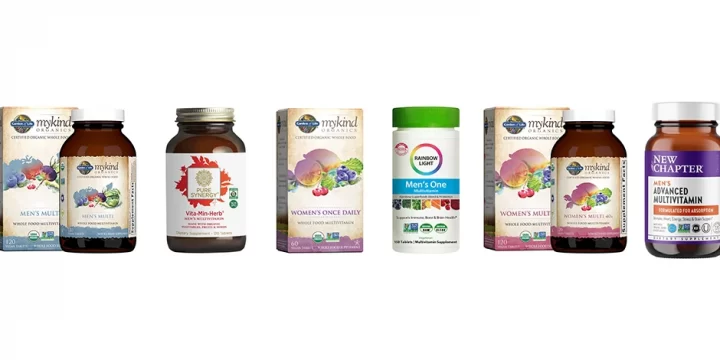Throughout my fitness journey, I've come to realize that one of the essential features of our digestive system is the absorption of key nutrients from the foods we eat and the supplements we take. It's fascinating how our body works.
As someone who has researched and used various brands of vitamin supplements throughout a long fitness career, I’ve noticed that many of them make bold claims about their contents and health benefits.
But contrary to what people may expect, your digestive system does not absorb everything from them as efficiently as the branding makes it seem.
Quick Summary
- The absorption percentage of multivitamins can vary widely, ranging between 10%-90%.
- A study by the National Institute of Health revealed that up to 90% of liquid vitamin nutrients might be absorbed, while only 10-20% from pills may be absorbed due to factors like digestion and solubility.
- Leading a healthier lifestyle and choosing high-quality multivitamins can significantly enhance the absorption rate and overall benefits.
-
To understand the absorption rate of multivitamins, it's essential to consider factors like their quality, the body's requirements, and individual lifestyle choices. Personally, I believe that not all multivitamins are created equal, and choosing the right one makes a difference.
How Much of a Multivitamin Is Actually Absorbed?
I remember when I first started taking multivitamins, I was curious about how much of it my body was actually using. It turns out, the absorption depends on the specific forms of vitamins and minerals in them, among other factors. And trust me, leading a healthier lifestyle definitely boosts the rate of absorption.
Several factors related to the multivitamin supplements, your body, and your lifestyle and nutrition play a role in how much is actually absorbed.
How Does Your Body Absorb Vitamins?

Your body absorbs the vitamins in your intestines. After food gets into the stomach, hydrochloric acid and certain enzymes break down fats, proteins, and carbohydrates.
At this stage, the digestive system extracts the vitamins and minerals from the digested food and takes them into the bloodstream.
According to a study by National Institute of Health, nutrients from any vitamin and mineral supplements are absorbed in the small intestine. Water-soluble vitamins synthesized by microbes in the large colon intestine are absorbed [1].
The following water-soluble vitamins from food are absorbed mainly in the small intestine:
- Folic Acid
- Thiamine
- Riboflavin
- Niacin
- Pantothenic acid
- Biotin
- Vitamins B6, B12, and C
Fat-soluble vitamins are absorbed by being incorporated into the bowels with other lipids. As per a study by VIVO Pathophysiology, the body absorbs a compound or mineral and enters the intestinal absorptive cells (enterocytes) through diffusion [2].
Vitamin B12
In addition to the water-soluble vitamins mentioned, vitamin B12 is also primarily absorbed in the small intestine. Vitamin B12 requires a protein called intrinsic factor, which is produced in the stomach, to be absorbed effectively in the small intestine.
Vitamin A and K
Vitamin A absorption and vitamin K absorption, occurs by being incorporated into the bile and other lipids. The body absorbs these vitamins in the small intestine, where they are taken up by the intestinal absorptive cells (enterocytes) through a process called diffusion.
“You take the healthiest diet in the world, if you gave those people vitamins, they would be twice as healthy. So vitamins are valuable”.
- Robert Coleman Atkins, American Physician & Cardiologist
Comparison Between Liquid Vitamins and Pills
Liquid vitamins are generally absorbed more efficiently than pills.
According to a study by National Institute of Health, the body may absorb up to 90% of liquid vitamin nutrients, while only 10-20% of the vitamins and minerals from pills may be absorbed into the bloodstream due to factors like digestion and solubility [3].
Liquid forms offer better bioavailability.
What Stops Them from Being Absorbed Properly?

Over the years, I've noticed that despite taking my vitamins regularly, there were times I didn't feel their effects. I later discovered that various lifestyle choices and other factors can hinder proper absorption.
Let's dive into some of these factors that I've come across.
Lack of Bioavailability
Different compounds have different bioavailability — the degree and rate the body absorbs a compound or mineral.
A 2019 study by National Institute of Health showed that oil-based vitamin D capsules were a highly bioavailable supplement form of this nutrient [4].
Age
A 2002 study published in the National Library of Medicine found that the intestine's ability to adapt to absorbing carbohydrates, lipids, amino acids, vitamins, and minerals decreases with age and may lead to further malnutrition [5].
Lack of Dietary Fat
If you lack fat in your diet, your body will not properly absorb specific vitamins.
For example, this 2016 study in the National Center of Biotechnological Information shows that vitamin E is better absorbed by the body when consumed with dietary fat [6].
Smoking and Drinking
According to National Institute of Healh, the nicotine from smoking tobacco negatively affects the body’s ability to absorb vitamins D and C, while drinking affects folate absorption [7].
Current Dietary Guidelines for Americans instruct that women should limit themselves to one drink and men to two [8].
It’s ultimately hard to put a number on how much each of these factors affects your body’s vitamin absorption capability. In my experience, it’s better to gravitate towards the side of it having an effect more significant than you think.
Certain Medications
Certain medications can hinder the absorption of essential vitamins and minerals.
For example, proton pump inhibitors (PPIs) can reduce stomach acid production, affecting the absorption of vitamin B12 and calcium.
Cholesterol-lowering drugs like statins may impede the production of coenzyme Q10.
Antibiotics can disrupt gut flora, affecting vitamin K and biotin.
Related Article: How Long Does It Take for Multivitamins to Work?
How Can I Maximize My Multivitamin Absorption?

A lesson I've learned from years of experimenting with supplements is that to truly maximize multivitamin absorption, it's crucial to choose those made from natural products with high purity and potency. It makes a world of difference.
You should also make sure your multivitamins have the following:
High Bioavailability
Look for brands with highly bioavailable forms of vitamins and minerals. Higher bioavailability means that your vitamins will be absorbed into your bloodstream more easily.
Ingredients like sugar and corn syrup are added to multivitamins as fillers. Like binders, fillers serve no nutritional benefit and will lead to unnecessary weight gain.
Healthy Diet
The best way to take your multivitamins is by combining them with healthy foods. A poor diet will affect your body’s absorption rate of multivitamins because it could lack the necessary complementary nutrients required for effective absorption.
For example, this study from National Institute of Arthritis and Musculoskeletal and Skin Diseases found that a person taking vitamin D supplements will not benefit from it if not eating calcium-rich foods [9].
All the vitamins and minerals your body requires are found in the food you consume.
Add Some Spice
Spicy foods contain thermo-nutrients — compounds that generate heat when digested.
In addition to boosting metabolism, thermo-nutrients are known to increase multivitamin and nutrient absorption.
Combination and Separation of Vitamins

To improve absorption rates, specific vitamins need to be taken together, whereas some combinations should be avoided.
For example, a study by the American Journal of Clinical Nutrition shows that taking vitamin C and iron together is beneficial for iron absorption. On the other hand, zinc and copper don’t absorb well when taken together as they compete for the same receptors [10].
References:
- https://www.ncbi.nlm.nih.gov/books/NBK538510/
- http://www.vivo.colostate.edu/hbooks/pathphys/digestion/smallgut/absorb_lipids.html
- https://www.ncbi.nlm.nih.gov/pmc/articles/PMC6631968/
- https://pubmed.ncbi.nlm.nih.gov/11977925/
- https://www.ncbi.nlm.nih.gov/pmc/articles/PMC4810759/
- https://pubmed.ncbi.nlm.nih.gov/1784736/
- https://www.dietaryguidelines.gov/sites/default/files/2021-03/Dietary_Guidelines_for_Americans-2020-2025.pdf
- https://www.bones.nih.gov/health-info/bone/bone-health/nutrition/calcium-and-vitamin-d-important-every-age
- Badmaev, Vladimir, Muhammed Majeed, and Lakshmi Prakash. "Piperine derived from black pepper increases the plasma levels of coenzyme Q10 following oral supplementation." The Journal of Nutritional Biochemistry 11.2 (2000): 109-113
- https://academic.oup.com/ajcn/article-abstract/34/9/1670/4693450
About The Author
You May Also Like






